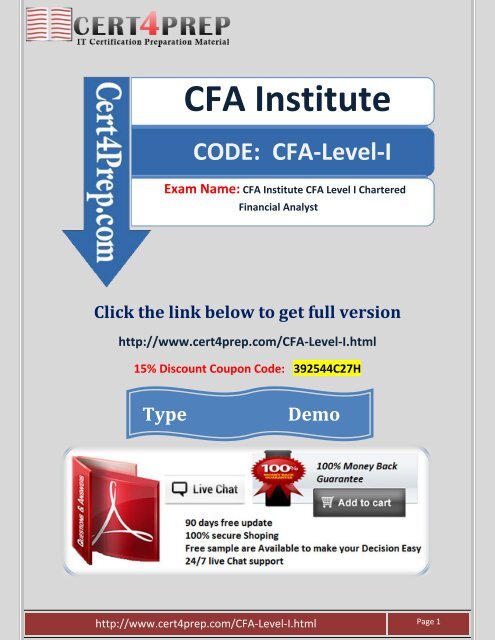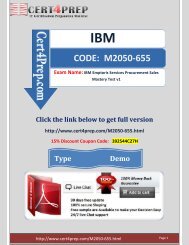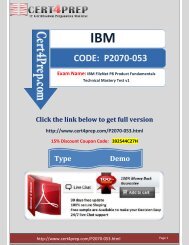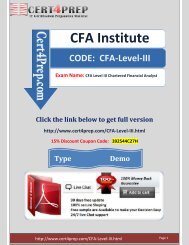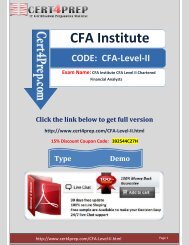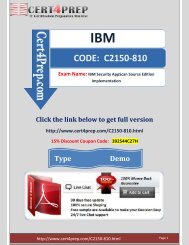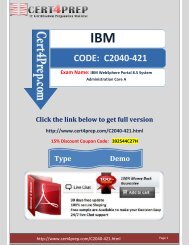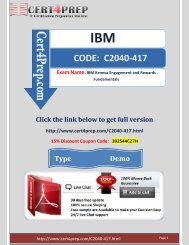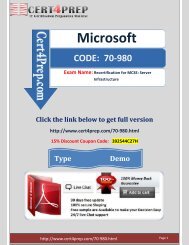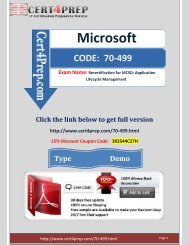CFA-Level-l Exam Practice Questions Answer.pdf
Cert4Prep is your ultimate source for exam questions and answers pdf type pdf questions and answers.
Cert4Prep is your ultimate source for exam questions and answers pdf type pdf questions and answers.
You also want an ePaper? Increase the reach of your titles
YUMPU automatically turns print PDFs into web optimized ePapers that Google loves.
<strong>CFA</strong> Institute<br />
CODE: <strong>CFA</strong>-<strong>Level</strong>-I<br />
<strong>Exam</strong> Name: <strong>CFA</strong> Institute <strong>CFA</strong> <strong>Level</strong> I Chartered<br />
Financial Analyst<br />
Click the link below to get full version<br />
http://www.cert4prep.com/<strong>CFA</strong>-<strong>Level</strong>-I.html<br />
15% Discount Coupon Code: 392544C27H<br />
Type<br />
Demo<br />
http://www.cert4prep.com/<strong>CFA</strong>-<strong>Level</strong>-I.html Page 1
Question: 1<br />
Stripe Green is an equity analyst who is offered a freelance project to write a research report by Square<br />
Bus. Which of the following is the correct choice for Stripe with regards to compensation?<br />
A. Accept a fee that pays him higher if gives a buy recommendation to Square Bus.<br />
B. Accept a flat fee that is not based on whether he recommends Square Bus or not in the research<br />
report.<br />
C. Accept a fee that pays him proportional to the number of equity Square Bus sells while using the<br />
report for advertising.<br />
Question: 2<br />
<strong>Answer</strong>: B<br />
Which of the following is false for GIPS composites?<br />
A. Composites are defined based on a common investment objective or strategy.<br />
B. Nondiscretionary accounts must all be in the same composite.<br />
C. Actual, fee-paying, discretionary portfolios must be included in at least one composite.<br />
Question: 3<br />
<strong>Answer</strong>: B<br />
PS Partners, a money management firm, uses different brokers for it trading. Most brokerage work is<br />
given to NP Ltd. The commissions charged by NP are higher than many other competitors, nor is its<br />
execution any better. NP pays for over half of PS's advertising expenses.<br />
A. PS has violated Standard III (A) Loyalty, Prudence, and Care by not obtaining the best brokerage for<br />
their clients.<br />
B. PS has violated Standard III (B) Fair Dealing by not obtaining the best brokerage for their clients.<br />
C. PS has violated Standard III (C) Suitability by not obtaining the best brokerage for their clients.<br />
<strong>Answer</strong>: A<br />
http://www.cert4prep.com/<strong>CFA</strong>-<strong>Level</strong>-I.html Page 2
Question: 4<br />
James Johnson runs a high income fund and concentrates mostly on utilities. A friend who works for a startup<br />
pharma firm gives Johnson a tip that the FDA has approved a drug for the pharma firm. Based on the tip<br />
Johnson immediately purchases the pharma firm's stock for his high income fund. The pharma firm does not<br />
pay dividends, nor does it expect to pay dividends in the near future. Which of the following Standards has<br />
Johnson violated?<br />
A. Standard II (A) Material Nonpublic Information only<br />
B. Standard III (C) Suitability only<br />
C. Standard II (A) Material Nonpublic Information, Standard<br />
III (C) Suitability, and Standard<br />
V (A) Diligence and Reasonable Basis<br />
Question: 5<br />
<strong>Answer</strong>: C<br />
Mike Peng is a portfolio manager who frequently lunches at the Downtown Grill which is also patronized by<br />
many other finance professionals. A week back he overheard two traders discuss GS Enterprises which they<br />
felt was going to be target of an yet undisclosed takeover. Wishing to purchase stock before the takeover was<br />
revealed and price went up, immediately after lunch Peng placed orders for the stock to be purchased on his<br />
personal account. He followed this by purchasing the stock for his clients accounts. Which of the following<br />
Standards has Peng violated?<br />
A. Only V (A): Diligence and Reasonable Basis<br />
B. Both III (A): Loyalty, Prudence, and Care and V (A): Dilig and Reasonable Basis<br />
C. Only III (A): Loyalty, Prudence, and Care<br />
Question: 6<br />
<strong>Answer</strong>: B<br />
Mark Sanchez and Felix Rodriguez both have passed <strong>CFA</strong> <strong>Level</strong> II and work for KD Partners. They have<br />
registered for the <strong>Level</strong> III exam to be held in December 2010. Sanchez's business card reads '<strong>CFA</strong> <strong>Level</strong> II'<br />
after his name. Rodriguez's introduces himself to prospective clients as 'I am Felix Rodriguez, a 2010 <strong>Level</strong> III<br />
<strong>CFA</strong> candidate.' Who is violating Standard VII (B): Reference to <strong>CFA</strong> Institute, the <strong>CFA</strong> Designation, and the<br />
<strong>CFA</strong> Program?<br />
A. Sanchez<br />
B. Both Sanchez and Rodriguez<br />
http://www.cert4prep.com/<strong>CFA</strong>-<strong>Level</strong>-I.html Page 3
C. Rodriguez<br />
<strong>Answer</strong>: A<br />
Question: 7<br />
Madeline Hall is in charge of marketing materials for her firm. Due to a typographical error (typo), a<br />
brochure sent to clients overstates the returns on money managed by the firm as 7.92% rather than<br />
6.92%. Which one of the following action(s) is (are) the most appropriate for Hall to keep her in<br />
compliance of the Standards?<br />
A. Inform clients to who the brochure has been sent out about the error and correct the error in future<br />
brochures.<br />
B. Pay an extra 1% return from the firm's own funds to clients who received the brochure.<br />
C. No action is needed as the error was unintentional.<br />
Question: 8<br />
<strong>Answer</strong>: A<br />
Landon Wilson runs an equity fund. GQT Enterprises is facing a hosting takeover, and approaches Wilson<br />
to purchase its stock and vote in favor of existing management. In return GQT promises Wilson nonpublic<br />
material information in the future. Wilson declines the offer of any future non-public material<br />
information. Wilson also researchers GQT stock and concludes it is underpriced and suitable for his<br />
clients. He purchases a large block of GQT stock and votes in favor of existing management. The success<br />
of the hostile takeover would have resulted in further gains for GQT stockholders. Which of the<br />
following action(s) of King violates Standard III (A) Loyalty, Prudence and Care?<br />
A. Voting in favor of existing management.<br />
B. Purchase of large block of GQT stock.<br />
C. No violation.<br />
Question: 9<br />
<strong>Answer</strong>: A<br />
Amelia Scott works for an investment management firm in New York. She is posted in country Turnipia for a<br />
short term assignment where she manages investments by Sergio Cabrera. Turnipia law requires that an<br />
investment managers disclose his or her client's investment details to the client's employers on request.<br />
http://www.cert4prep.com/<strong>CFA</strong>-<strong>Level</strong>-I.html Page 4
Cabrera's employer asks Scott to provide details about Cabrera's investments. Scott examines Cabrera's<br />
account and concludes that he has not done anything illegal. What is the proper course of action for Scott?<br />
A. Disclose Cabrera's investments.<br />
B. Not disclose Cabrera's investments and resign from managing his account.<br />
C. Not disclose Cabrera's investments while continuing to manage his account.<br />
Question: 10<br />
<strong>Answer</strong>: A<br />
Grace Carter supervises analysts at the firm AFD Brokers. A team led by Carter analyzes DFA Corp., evaluating<br />
the industry, future demand and cost trends. A lot of the conversations between the team occur in the<br />
hallways where they are overheard by AFD salespeople. Carter's team arrive at a conclusion that DFA is<br />
undervalued and prepare a report for AFD clients recommending the purchase of DFA stock. Before the<br />
report is distributed, based on the conversations of Carter's team that they have overheard, the salespeople<br />
purchase AFD stock. Which of the following is correct with respect to the Standards?<br />
A. Carter has violated responsibilities of supervisors, and the salespeople have violated restrictions on<br />
use of non-public material information.<br />
B. Only the salespeople have violated restrictions on use of non-public material information.<br />
C. Only Carter has violated responsibilities of supervisors.<br />
Question: 11<br />
<strong>Answer</strong>: A<br />
Isabelle Perez runs a value fund that invests mainly in domestic consumer goods firms with high book to<br />
market ratio. Around the middle of the quarter, Perez comes across a couple of newsletters that claim<br />
value will do poorly over the next few quarters. Based on this, Perez changes her investments to low<br />
book to market energy firms. She informs her clients of the change a month later in her quarterly report.<br />
A. Perez has not committed any violation.<br />
B. Perez has only violated the requirements of diligence and reasonable basis.<br />
C. Perez has violated the requirements of diligence and reasonable basis and the requirements<br />
for communication with prospective clients.<br />
<strong>Answer</strong>: C<br />
http://www.cert4prep.com/<strong>CFA</strong>-<strong>Level</strong>-I.html Page 5
Question: 12<br />
Ket Garo, <strong>CFA</strong> tells his employer that he was chosen by faculty in his undergraduate to represent his<br />
college in a national asset management competition. In reality, Garo was not selected and did not<br />
participate in the competition. Which Standards has Garo most likely violated?<br />
A. Duties to Employers<br />
B. Professional Misconduct<br />
C. Duties to Clients<br />
Question: 13<br />
<strong>Answer</strong>: B<br />
Sophia Wright is the investment manager for several institutional clients. Wright directs trades on behalf of<br />
her clients to BAQ Securities. In return BAQ pays for a yearly vacation for Wright and provides Wright with<br />
equity research that she uses for making investment decisions for her clients. Wright does not disclose this<br />
arrangement to her clients. BAQ also does not provide the best price and execution. Wright has violated:<br />
A. No violations if the equity research leads to positive returns for clients.<br />
B. No violations if the yearly vacations are inexpensive.<br />
C. Standard III (A) Loyalty, Prudence and Care.<br />
Question: 14<br />
<strong>Answer</strong>: C<br />
Isabella Walker offers credit guidance to purchasers of corporate bonds. Her firm has a large inventory of<br />
bonds of TPQ Corp. which is facing financial difficulties. The sales department of her firm asks her to<br />
recommend TPQ bonds to her clients. After analyzing the bonds Walker concludes that they are<br />
underpriced,even after accounting for TPQ's financial difficulties. Walker next contacts her clients and<br />
recommends they purchase TPQ's bonds. Walker has:<br />
A. violated only Standard I (B) Independence and Objectivity.<br />
B. not violated the Standards.<br />
C. violated Standard I (B) Independence and Objectivity and Standard III (C) Suitability.<br />
<strong>Answer</strong>: B<br />
http://www.cert4prep.com/<strong>CFA</strong>-<strong>Level</strong>-I.html Page 6
Question: 15<br />
Ravi Reddy is an investment analyst with HC International, which owns stock of CC Ltd. Reddy's share of<br />
any profits made by HC from sale of CC stock is 15%. Reddy writes a favorable research report on CC<br />
after extensive research on CC, the industry it is in, and its competitors. Reddy does not disclose HC's<br />
ownership of CC's stock or his share of HC's profits.<br />
A. I (B): Independence and Objectivity<br />
B. Both I (B): Independence and Objectivity and VI (A): Disclosure of Conflicts<br />
C. VI (A): Disclosure of Conflicts<br />
Question: 16<br />
<strong>Answer</strong>: B<br />
Rakesh Kumar works as a fund manager for PV InC. but has been offered a job by KS Partners. He has<br />
accepted the offer and will be leaving PV InC. at the end of the month. A week prior to leaving he is<br />
contacted by a prospective client. Kumar does not follow up with the client on behalf of PV, but decides<br />
to wait to pursue the client till he joins KS.<br />
A. Kumar has violated Standard IV: Loyalty by accepting an employment offer from KS while he was still<br />
employed by PV.<br />
B. Kumar has violated Standard IV: Loyalty by depriving his employer the potential benefit from the<br />
prospective client.<br />
C. Kumar has not violated Standard IV: Loyalty if he doesn't take any written records of the prospective<br />
client with him to his new job.<br />
Question: 17<br />
<strong>Answer</strong>: B<br />
Matthew Savage, <strong>CFA</strong> is a portfolio manager. Savage serves on the board of GXT Corporation and has<br />
substantial positions in GXT. Savage acquires a new client to whom he does not disclose his GXT board<br />
membership or his obligations as a <strong>CFA</strong> charterholder. Savage has violated the Standards?<br />
A. Yes, because of failure to disclose his obligations as a <strong>CFA</strong> charterholder.<br />
B. No<br />
C. Yes, because of failure to disclose his GXT board membership.<br />
http://www.cert4prep.com/<strong>CFA</strong>-<strong>Level</strong>-I.html Page 7
<strong>Answer</strong>: C<br />
Question: 18<br />
SL Industries has hired MM Analytics owned by Gerry Crawford to publicize the firm. SL pays MM and in<br />
return Crawford sends out spam emails pumping up SL stock. These emails do not disclose the payments<br />
received by MM from SL. Also the emails knowingly overstate profits of SL. Which of the following<br />
standard(s) has Crawford not violated?<br />
A. Standard VI (A) Disclosure of Conflicts<br />
B. Standard III (B) Fair Dealing<br />
C. Standard II (B) Market Manipulation and Standard V (A) Diligence and Reasonable Basis<br />
Question: 19<br />
<strong>Answer</strong>: B<br />
Carly Shuttle manages money for a client and has over the past five years achieved a return greater than<br />
the benchmark. In appreciation the client gifts Carly an all expenses paid Monaco weekend. Carly<br />
believes that the gift does not create a conflict of interest and does not disclose the gift to her<br />
supervisor.<br />
A. Carly has not violated the Standards.<br />
B. Carly has violated Standard I (B) Independence and Objectivity.<br />
C. Carly has not violated Standards I (B) Independence and Objectivity if after using her judgment she<br />
feels the gift did not compromise her independence.Needs to disclose gift to employer<br />
Question: 20<br />
<strong>Answer</strong>: B<br />
Rajat Sharma, <strong>CFA</strong> achieved superior returns as a portfolio manager when he . was KJI Advisors. After<br />
leaving KJI, Sharma joined AER Ltd. In a presentation to AER clients, Sharma uses the returns he<br />
achieved at KJI, without clarifying that the returns were obtainedduring his employment at KiT. Has<br />
Sharma violated the Standards?<br />
A. Yes, Misrepresentation /<br />
B. No<br />
C. Yes, Communication with Clients and Prospective Clients<br />
http://www.cert4prep.com/<strong>CFA</strong>-<strong>Level</strong>-I.html Page 8
<strong>Answer</strong>: A<br />
Explanation:<br />
It may be tempting to conclude that this is a Communication violation, but it is really<br />
Misrepresentation. The Communication Standard requires:<br />
1. Disclose to clients and prospective clients the basic format and general principles of the investment<br />
processes used to analyze investments, select securities and construct portfolios, and must promptly<br />
disclose any changes that might materially affect those processes.<br />
2. Use reasonable judgment in identifying which factors are important to their investment analyses,<br />
recommendations or actions, and include those factors in communications with clients and prospective<br />
clients.<br />
3. Distinguish between fact and opinion in the presentation of investment analysis and<br />
recommendations. You can see none of the Communication requirements fit the situation<br />
described.<br />
Question: 21<br />
Jeremy Juniper is a part of the team of ZS InC. working on a secondary offerin for PD LLC. During lunch at the<br />
ZS cafeteria Jeremy gets into a discussion with a fellow team member about revenue forecasts for PD being<br />
significantly higher than expected and how that would affect the pricing of the secondary offer. Sped Rami is<br />
another employee of ZS at the same lunch table who overhears the conversation an later purchase shares of<br />
PD.<br />
A. Sped has violated Standard 11(A) Material Nonpublic Information but not Jeremy.<br />
B. Both Jeremy and Sped has violated Standard 11(A) Material Nonpublic Information.<br />
C. Neither Jeremy nor Sped have violated Standard 11(A) Material Nonpublic Information.<br />
<strong>Answer</strong>: B<br />
Explanation:<br />
Jeremy has violated the Standard as he failed to exercise care to keep the material non-public<br />
information from being disclosed to Sped, and Sped violated the Standard as he traded based on that<br />
information.<br />
Question: 22<br />
Noah Williams, <strong>CFA</strong> has started his own investment advisory firm. He distribute marketing material to<br />
prospective clients which includes the statement ‘Over the past 9 years, I have consistently beaten my<br />
benchmark market index by at least 5%’. At the bottom of a page, in small print, he adds the disclaimer ‘past<br />
performance does not guarantee future returns’. Has Williams violated the standards?<br />
http://www.cert4prep.com/<strong>CFA</strong>-<strong>Level</strong>-I.html Page 9
A. Yes, Duties to Clients<br />
B. No<br />
C. Yes, Communication with Clients And Prospective Clients<br />
<strong>Answer</strong>: B<br />
Explanation:<br />
Use of small print in marketing materials for disclaimers such as ‘past performance does not guarantee<br />
future returns’ is not a violation of the Standards.<br />
Question: 23<br />
Which of the following is most likely correct?<br />
A. When a block order is partially executed, allocating partially executed orders among the participating<br />
client accounts pro rata on the basis of order size is recommended for compliance with Standard III (B)<br />
Fair Dealing.<br />
B. Trade allocation procedures being disclosed to all clients prior to their retaining the services of a firm<br />
is sufficient for compliance with Standard III (B) Fair Dealing.<br />
C. Trade allocation procedures being disclosed to all clients prior to their retaining the services of a firm<br />
is sufficient for compliance with Standard V (B) Communication With Clients and Prospective Clients.<br />
<strong>Answer</strong>: A<br />
Explanation:<br />
Disclosure of inequitable allocation procedures is not sufficient for compliance. Also trade allocation<br />
procedures are not related to Standard V (B) Communication With Clients and Prospective Clients.<br />
Question: 24<br />
Ed Yang, <strong>CFA</strong> submits a written request to employer for permission to do a consulting project for<br />
another firm. The work would be done on weekends. After waiting for 3 months for a reply but not<br />
receiving one, Yang begins work on the consulting project. Has Yang violated the Standards?<br />
A. No<br />
B. No, if the consulting work is not for a competitor of his employer.<br />
C. Yes<br />
<strong>Answer</strong>: C<br />
http://www.cert4prep.com/<strong>CFA</strong>-<strong>Level</strong>-I.html Page 10
Explanation:<br />
Employee submits written request to employer for permission to engage in outside work. Lack of<br />
response from employer within a given timeframe does not mean employee can accept outside work.<br />
Question: 25<br />
Jacob Miller, <strong>CFA</strong> runs a mutual fund Enhanced Global Equity whose stated objective is to identify and<br />
invest in the equity of undervalued global firms. Miller believes that stock markets around the world are<br />
currently too high. He sells the equity holdings of the fund and invest in domestic corporate bonds<br />
(which he believes are currently undervalued). Has Miller violated the Standards?<br />
A. Yes, Diligence and Reasonable Basis<br />
B. Yes, Suitability<br />
C. No<br />
<strong>Answer</strong>: B<br />
Explanation:<br />
Money managers must take investment decisions consistent with their stated objectives. For example, a<br />
money manager for a Global Equity fund investing in domestic corporate bonds would be a violation of<br />
suitability.<br />
http://www.cert4prep.com/<strong>CFA</strong>-<strong>Level</strong>-I.html Page 11
<strong>CFA</strong> Institute<br />
CODE: <strong>CFA</strong>-<strong>Level</strong>-I<br />
<strong>Exam</strong> Name: <strong>CFA</strong> Institute <strong>CFA</strong> <strong>Level</strong> I Chartered<br />
Financial Analyst<br />
Click the link below to get full version<br />
http://www.cert4prep.com/<strong>CFA</strong>-<strong>Level</strong>-I.html<br />
15% Discount Coupon Code: 392544C27H<br />
http://www.cert4prep.com/<strong>CFA</strong>-<strong>Level</strong>-I.html Page 12


